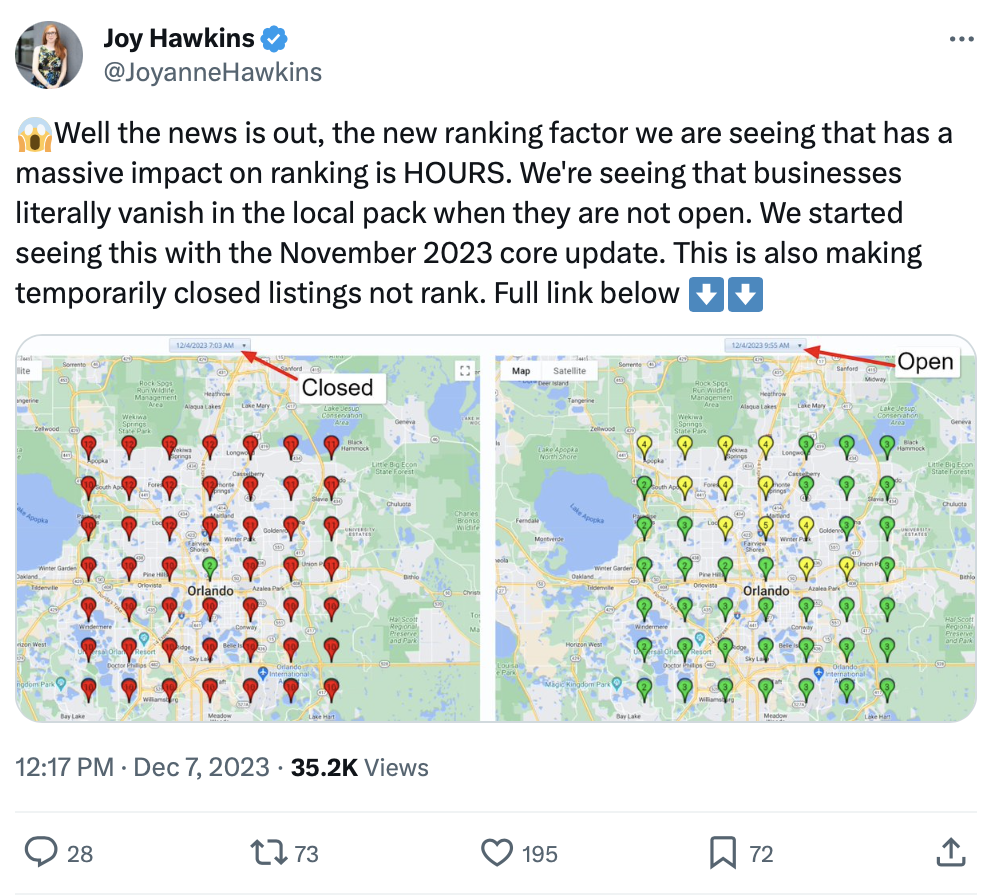Publishing accurate location information on Google remains crucial for businesses looking to enhance their local search rankings. Google recently underlined the importance of sharing accurate location information by changing its algorithm to rank businesses that are open more often in its local search rankings higher than businesses that are closed. This is an important change especially coming at a time when many locations change their hours of operation during the holidays.
Google Rewards “Openness” as a Local Ranking Factor
Search practitioner Joy Hawkins first reported on X, formerly known as Twitter, that following a November Google algorithm update, businesses were vanishing from local pack search results when they were closed:

Previously, Google would list a business in a local search even if that location was closed at the time the search was made. Now, Google is boosting visibility in search results for businesses that are open. The change has since been confirmed by Google. This is true for both navigational searches (where the intent to find a location is clear) and non-navigational (when someone is searching for types of services versus specific brands).
Why Is “Openness” a More Important Local Ranking Factor?
Google remains committed to providing the best user experience possible to anyone who uses its products, including Google Search, which is core to the Google ecosystem. Google remains far and away the dominant player in search. As Reputation has reported, Google Search time and again is an important tool for consumers searching for every type of business ranging from retailers to hospitals. Google needs to defend its turf. Making search more useful by serving up the most accurate search results possible is part of that strategy. Locations such as automotive dealerships and large retailers have always offered services with hours that differ (a pharmacy inside a Walmart or Target might be closed even though Walmart or Target is open for shopping). In addition, many businesses, especially since the pandemic, have experienced myriad factors such as staffing shortages affecting their hours of operation from one location to the next. (In 2020, as many businesses began to operate variable hours for drive-through, walk-in, and other options to cater to rapidly changing shopping habits, Google began to adapt by giving users new types of business hours to reflect this reality.) In short, Google is adapting.
Answers to Commonly Asked Questions about the “Openness” Local Ranking Factor
News of the algorithm update sparked a flurry of questions from users on X (formerly Twitter). For example:
- What should a business do if it’s technically closed but still offers 24/7 service via a chatbot?
- Answer: don’t say your location is open if indeed your business is closed or else you risk getting penalized by Google. But do mention on your Google Business Profile (and everywhere else online) if you do indeed offer support after hours for queries.
- Won’t businesses try to game the system by listing “open” hours even if they are closed?
- Answer: don’t try to do that. As Google’s Danny Sullivan noted (under the Twitter/X handle @GoogleSearchLiaison), “I wouldn't recommend businesses do this [switch hours to 24/7 unless they are indeed open 24/7], given the ranking signal may continue to be adjusted.”
- Does this change affect Google Maps?
- Answer: so far, it looks like only Google Search is affected. On Google Maps, you still need to click “Open Now” to filter the results.
- Why is a general search considered nonnavigational just because the search does not include the name of a brand? As one user asked, What if you’re looking for a place to eat lunch tomorrow? Or a place to have a drink when you’re on your trip this weekend?
What Businesses Should Do
- Keep your hours up to date. Make sure they are always up to date especially if they are affected by the holidays.
- Be accurate. Don’t list “24/7” unless your location is truly open for business 24/7. Listing inaccurate information is a bad user experience and could result in your listing being suspended.
- Keep all your information up to date. Google continues to adapt its algorithm. You don’t want to find yourself trying to play catch-up when Google decides to elevate another local search ranking factor.
- Do your homework. Read the annual Whitespark report on local ranking factors and analysis such as our blog content.
To grow your business through reputation experience management, contact Reputation. Our SaaS-based Reputation platform manages tens of millions of consumer reviews and consumer interactions across hundreds of thousands of touchpoints. Explore our website to learn more.






